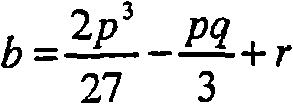Method of registering images, algorithm for carrying out the method of registering images, a program for registering images using the said algorithm and a method of treating biomedical images to reduc
An object movement, biomedical technology, applied in image data processing, image analysis, image enhancement and other directions, can solve the problem of image sequence not having satisfactory visual appearance, image rendering is not clear enough, showing other effects and other problems
Inactive Publication Date: 2008-10-29
BRACCO IMAGINIG SPA
View PDF1 Cites 41 Cited by
- Summary
- Abstract
- Description
- Claims
- Application Information
AI Technical Summary
Problems solved by technology
However, the registered image sequences do not have a satisfactory visual appearance
After processing an image using the methods above, the image appears less sharp or shows other effects
Method used
the structure of the environmentally friendly knitted fabric provided by the present invention; figure 2 Flow chart of the yarn wrapping machine for environmentally friendly knitted fabrics and storage devices; image 3 Is the parameter map of the yarn covering machine
View moreImage
Smart Image Click on the blue labels to locate them in the text.
Smart ImageViewing Examples
Examples
Experimental program
Comparison scheme
Effect test
Embodiment approach
the structure of the environmentally friendly knitted fabric provided by the present invention; figure 2 Flow chart of the yarn wrapping machine for environmentally friendly knitted fabrics and storage devices; image 3 Is the parameter map of the yarn covering machine
Login to View More PUM
 Login to View More
Login to View More Abstract
In a method for registering biomedical images such as at least a first and a second digital or digitalized image or set of cross-sectional images of the same object, within the first image or set of images a certain number of landmarks, so called features are individuated by selecting a certain number of pixels or voxels. The position of each pixel or voxel selected as a feature is tracked from the first to the second image or set of images by determining the optical flow vector from the first to the second image or set of images for each pixel or voxel selected as a feature. Registration of the first and second images or set of images is carried out by applying the inverse optical flow to the pixels or voxels of the second image or set of images. The invention provides for an automatic trackable landmark selection step consisting in defining a pixel or voxel neighbourhood around each pixel or voxel of the first image or first set of cross-sectional images; for each target pixel or voxel determining one or more characteristic parameters which are calculated as a function of the parameters describing the appearance of the said target pixel or voxel and of each or a part of the pixels or voxels of the window and as a function of one or more characteristic parameters of either the numerical matrix or of a transformation of the said numerical matrix representing the pixels or voxels of the said window. The pixels or voxels coinciding with validly trackable landmarks are determined as a function of the said characteristic parameters of the target pixels or voxels.
Description
technical field The invention relates to a method for registering images, comprising the following steps: a) providing at least a first and a second digital or digitized image or set of cross-sectional images of the same object, said images being formed by a two-dimensional or three-dimensional array of pixels or voxels; b) defining a certain number of landmarks, i.e. features, within the first image or set of images by selecting a certain number of pixels or voxels to be set as markers or features, and generating an index of said features to be tracked list; c) by determining, for each pixel or voxel selected as a feature, the optical flow vector from the first to the second image or to the position of an image or group of images obtained at a later time, from the first to the said second or later acquired image or set of images tracks the position of each pixel or voxel selected as a feature; d) registering the first and second images or images or sets of images acquir...
Claims
the structure of the environmentally friendly knitted fabric provided by the present invention; figure 2 Flow chart of the yarn wrapping machine for environmentally friendly knitted fabrics and storage devices; image 3 Is the parameter map of the yarn covering machine
Login to View More Application Information
Patent Timeline
 Login to View More
Login to View More IPC IPC(8): G06T7/00
CPCG06T2207/10081G06T2207/10088G06T7/2066G06T7/0034G06T2207/30068G06T7/0038G06T7/0028G06T7/33G06T7/35G06T7/38G06T7/269
Inventor 马尔科·马蒂乌齐伊拉里亚·格里托尼·维尔纳沃姆维格
Owner BRACCO IMAGINIG SPA
Features
- R&D
- Intellectual Property
- Life Sciences
- Materials
- Tech Scout
Why Patsnap Eureka
- Unparalleled Data Quality
- Higher Quality Content
- 60% Fewer Hallucinations
Social media
Patsnap Eureka Blog
Learn More Browse by: Latest US Patents, China's latest patents, Technical Efficacy Thesaurus, Application Domain, Technology Topic, Popular Technical Reports.
© 2025 PatSnap. All rights reserved.Legal|Privacy policy|Modern Slavery Act Transparency Statement|Sitemap|About US| Contact US: help@patsnap.com



